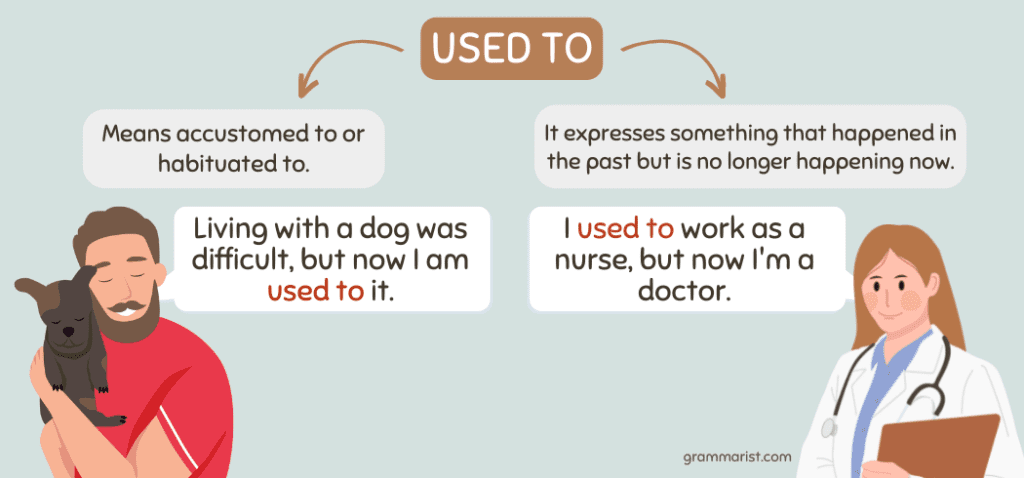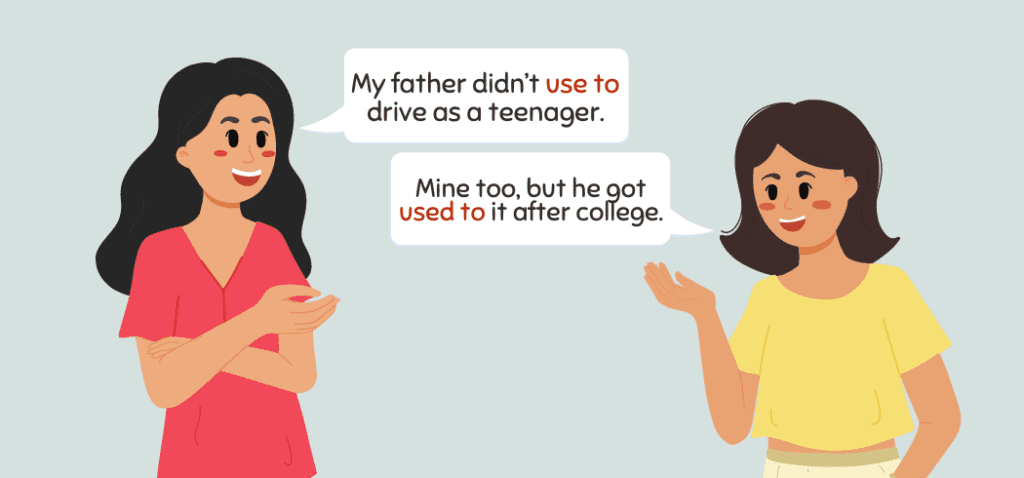Is it I use to be a singer or I used to be a singer? Perhaps you also wonder if it’s correct to say I’m used to the warm California weather. When speaking, it’s hard to tell the difference. But in writing, both phrases have completely different meanings, but I’ll explain everything you need to know.
Let’s dive deep into the two definitions of used to and some examples of how to use them in a sentence. I also explain when to use use to vs. used to in sentences.
“Used to” Meaning

The term used two has two possible definitions.
First, it can mean accustomed to or habituated to. In this case, we always say used to and not use to. You may be used to something like walking in the dark, horseback riding, or reading foreign literature. For example:
- Living with a dog was difficult, but now I am used to it.
- You need to get used to living on your own to prepare for college.
Another meaning of used to is formerly. It expresses something that happened in the past but is no longer valid or happening now. For example:
- I used to work as a nurse. (I am not a nurse anymore.)
- My daughter used to be shy, but now she’s confident.
Therefore, you can say living with a dog used to be difficult, but now you’re used to it.
How to Use “Used To”
I would use used to when referring to accustomed. For example:
- I am used to waking up early.
You can also use the verb get + used to or a combination of be + used to to show that you are in the state of being accustomed to something. For example:
- I should get used to reading more often.
When writing questions with used to, we use did + use to. For example:
- Did you use to have that car model?
Use the auxiliary verb did with used to to emphasize the action. For example:
- I didn’t learn how to bake a cake. But I did used to bake cookies for my friends.
Tag questions are also common with the phrase used to. The correct word to use for the question is always did. For example:
- Incorrect: He used to be on the basketball team, was he?
- Incorrect: He used to be on the basketball team, does he?
- Correct: He used to be on the basketball team, did he?
Is it “Use to” or “Used to”?

In most cases, the correct phrase is used to. For example:
- I used to be the president of the Drama Club.
- I got used to the heat.
The only time you can say use to is when writing it with the auxiliary verb did in interrogative and negative sentences. Note that we are referring to use to as formerly and not accustomed. For example:
- Did I use to play with these toy dolls?
- My father didn’t use to drive as a teenager.
What Part of Speech is “Used to”?
Used to with the definition formerly functions as a verb. A bare infinitive follows the preposition to. For example:
- I used to buy her flowers, but she’s allergic to them now.
Used to, which means accustomed to, is a past participle form of the verb that acts as an adjective. Its preceding verbs are usually be verbs and get. For example:
- I got used to calling him regularly.
Is “Used” a Verb?
Used is the simple past tense and past participle form of the verb use.
Final Word on “Used to”
The phrase used to in the English language should not intimidate you. All you have to do is treat it like any other verb or past participle form. Remember what I said about used to having two possible definitions:
- Accustomed to or habituated to
- Formerly (used to show former habit, situation, or action)
